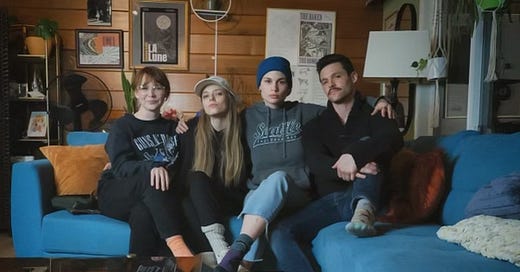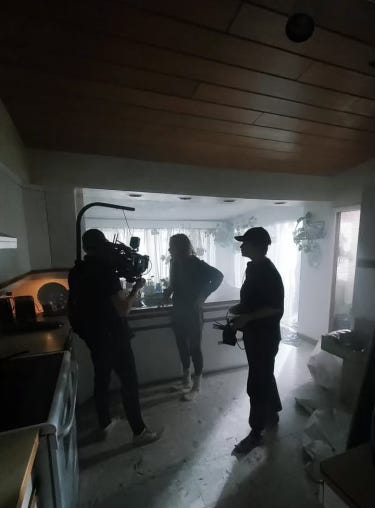Your message starts on set.
We keep talking about how everything sucks about the industry right now but can we talk about the good? What if the studio of our dreams starts on set?
When I decided to shift to the film industry and ultimately produce, I wanted as far away from some of my onstage experiences as possible. They were damaging. I remember reaching the “peak” of my career, and being the most unhappy, wondering if it was worth all of the effort, as some of the most horrendous things were said to me during that time.
For those of you new to “Rebel Waves”, Hey! I’m Makayla, a former dancer and musical theatre performer that shifted to film when an accident ended my dance career. I fell down a bridge on my bicycle, and the healing journey was more than physical. It changed everything about how I approach art and life.
challenged everyone to make a post on how WE would run a film studio. While I haven’t thought of myself as a film studio previously, the more I write, develop, produce, act, and read scripts, the more I realize that maybe… just maybe… a niche film studio of sorts is a possibility.I produced my first short in 2022, and in the last few years, I’ve built momentum through a feature, more shorts, writing a pilot (we will be at SeriesFest later this month) to the last short I filmed a few weeks ago tackling eating disorders.
In holding a position of leadership, I don’t take it lightly that I feel it is my duty and privilege to set the precedent for better, safer, and more cohesive sets.
I believe that how we run a studio, starts with how we treat people in pre-production, on set, post-production, and beyond.
In my feature, Shredded, we gave the key cast and crew back-end for helping us with our film. I believe that people should share in the success of helping bring a vision to life.
In Echo, a film dealing with eating disorders, a very sensitive and consuming topic, I knew that our language with all of our key crew was important from onset.
Megan and Roxanne first approached me in September, asking if I would be interested in talking about producing their short. I read the script, and I was hooked - it did not fall into the tropes of other films trying to tackle eating disorders and felt raw, visceral, and honest (everything that my statement of my production company embodies). I told them whether or not I produced the film or not, I felt it was important that each position we bring on, we set the precedent of language on set, and start each morning, after the safety meeting, with the following:
“First off, thank you so much for being a part of this production! We are beyond excited to have each and every one of you be a part of this film, this story and help share a little bit about this important topic.
As we are choosing to put health and wellness at the forefront of our mandate for this film. We would love to share a few tidbits with the crew and cast before we start the Journey on camera.
Much of Echo revolves around a potentially activating topic; eating disorders. Whether directly or indirectly, Eating Disorders have played some part in most individuals' worlds. As members of this team, we aim to hold space and support one another without assuming anyone's lived experiences. Be kind and courteous to one another on and off set choosing our words and actions accordingly around food, body and well-being; we kindly ask that there are no comments made in regards to body shapes, sizes, how people look, what people are or aren't eating, etc. While sometimes this can be fun banter or humour on other sets, and we hope to make precedent a norm, we respectively ask that none of those types of comments are made here. Please note this is not to discourage you from checking in on one another, just to do so with kindness. In addition, we may choose to have a closed set at any point to provide support to our cast members.”
We brought on a well-being coordinator, and while we “thankfully” didn’t have any incidents, many cast and crew felt safe knowing that she was available to them in case they needed it.
What happened was beautiful.
We created a space where people felt comfortable to share their stories.
We created a space where people did not comment on other peoples’ bodies.
We created a space where some people understood what being consumed by an eating disorder felt like, and how they were potentially harming their loved ones with their language.
We had cast and crew that had directly dealt with eating disorders or had a loved one who was, and we had some cast and crew who had not. The “win” for me as a producer, was when one of our crew members after the shoot, came to us and shared, that this film showed him how he was unknowingly damaging people close to him in what he was saying to them, which he thought was helpful, but in this experience, he learned was harmful.
We received multiple emails after, that thanked us for the environment we created on set, and that people felt valued and human. I mean, isnt’ that the least we can do? That’s not to say that our film wasn’t without challenges, as trust me, there was a night I was up until 3 AM solving issues. But if we can’t be human on set, why are we even doing this? Why are we telling human stories? Do we deserve to tell human stories if we cannot be compassionate and human?
If I ran a film studio, I would have a few principles in place:
We set an ethos in the company and hire people that align with those values and they permeate each part of the process from development to distribution.
All development and creative people share in the success of the studio.
We embolden, embrace, and uplift creatives with a variety of avenues to elevate them.
We find ways to make unforgettable and irresistible in-person experiences and make that the forefront of what we do: connection.
We are cool AF. and we evolve to uphold that.
What do you want to see change on set and in the creative world?
Xo M






